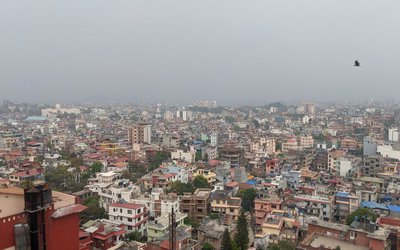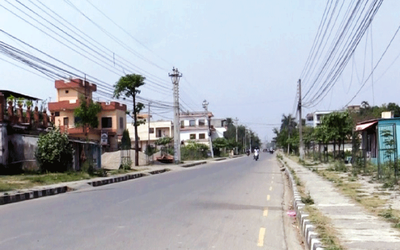As Nepal was engrossed in the festive Dashain mood, a contingent of Maoist commanders was spending a “paid holiday’ in China.
Three deputy commanders, Ananta, Prabhakar and Baldev were accompanied by division commanders of the UNMIN-monitored camps across the country.
The China visit of the deputy commanders, now in the civilian garb of Barsha Man Pun, Janardan Sharma and Chandra Prakash Khanal, has created a stir.
Prime Minister Madhav Kumar Nepal termed it a breach of comprehensive peace agreement – allegation the Maoists denied. (See Interview: box)
The incident, coming close on the heels of strained ties between the Nepalese Maoists and the influential southern neighbour, India, has added to the air of mutual mistrust in domestic politics as well.
At a time when the adjustment and the management of the Maoist combatants had become a major sticking point in efforts for the successful conclusion of the four-year old peace process, the sudden and quite tour of the Maoist commanders to the land of Mao without the knowledge of the multi-party special committee and the UNMIN has raised eyebrows in many quarters.
The combatants’ issue has become central in the peace process and the constitution making for two reasons.
One, the Maoists are keen to use it as a bargaining chip with other parties. Two, the other parties can not hope to take on the Maoists until and unless their fighters are demobilized.
The Maoists have of late pretended to be flexible, say critics, in the hope of regaining the seat of power in Singh Durbar.
But they warn that the Maoists do not want to sort out the combatants issue unless they are sure of a new constitution on their terms.
When in office, Maoist chief Prachanda had pledged to the Indian prime minister, Man Mohan Singh, and to the former Nepalese prime minister, Girija Prasad Koirala, that he was ready to integrate up to 5000 combatants.
He later told civil society members at a function that the integration would be complete three months after prime minister Madhav Nepal stepped down.
This clearly shows that, given the will, the Maoists do not have any big problem in resolving the issue.
But they want to make it sure that power comes to them first.
The recent agreement on bringing the combatants under the special committee will have to be viewed in this backdrop.
In fact, a joint proposal prepared by Barsha Man Pun and UML general secretary Iswor Pokharel had clearly mentioned that the Maoist-led government would not be possible without agreement on integrating 5000 to 7000 combatants, although the Maoists had publicly taken a different posture.
It was following a tacit agreement with the prime minister Nepal that the Maoist chief Prachanda had dispatched his senior confidantes to the camps to read the mind of the combatants and take them into confidence on their future.
The combatants were however in a combative mood. In a camp in Nawalparasi on September 30, a group of 18 combatants had a chorus to play to the visiting deputy commander, “bring us the modalities of the adjustment, if not give us order to fight if we are being kept here for the purpose.”
Interestingly, the four-point agreement between prime minister Nepal and Prachanda has not moved an inch further since then.
No meeting has been called since then nor the Nepal-Prachanda agreement implemented.
Confided an unnamed politburo member, “those were all make-believes aimed at sending a positive message to the depressed and frustrated populace.
That no decision within the party has been made on integration corroborates the claim. Many in the party still believe that the power-capture through a revolt not through peaceful process and new constitution should be the only course for the future.
Insiders say, Prachanda looks flexible on the combatants’ issue with other parties and the international community. But he is equally inflexible within the party.
To the outsiders, he promises to sort it out provided this ensured his return to power. To the insiders, Prachanda rules out the integration of the combatants.
All he wants is power for him, says a critic within the party. He tried to woo president Ram Baran Yadav in a one-to-one dinner meeting at Shital Niwas and sought to win over prime minister Madhav Nepal through agreement on combatants’ issue.
He has been desperately trying to reach out to the influential power centre – New Delhi. To no avail – so far.
Upset, he sent a contingent of Maoist commanders to China in a bid to avenge Delhi’s cold-shouldering, on one hand, and bargain for a better deal, on the other.
Demobilizing the 19000 combatants living in the camps and disbanding the covertly armed YCL do not figure in his priority.
There lies the real problem to sorting out the issue and take the peace process to “a logical conclusion”. They had agreed – in private -- to appoint a non-Maoist as the head of the special committee secretariat, declare that all combatants have come under the government, fix the date of integration from the camps and complete the process in 60 days.In the September 30 meeting of the special committee, Maoist delegates, Ananta and Prabhakar, asked for four more days to formally make those four decisions.
No meeting has been called since then nor the Nepal-Prachanda agreement implemented.
Confided an unnamed politburo member, “those were all make-believes aimed at sending a positive message to the depressed and frustrated populace.
That no decision within the party has been made on integration corroborates the claim. Many in the party still believe that the power-capture through a revolt not through peaceful process and new constitution should be the only course for the future.
Insiders say, Prachanda looks flexible on the combatants’ issue with other parties and the international community. But he is equally inflexible within the party.
To the outsiders, he promises to sort it out provided this ensured his return to power. To the insiders, Prachanda rules out the integration of the combatants.
All he wants is power for him, says a critic within the party. He tried to woo president Ram Baran Yadav in a one-to-one dinner meeting at Shital Niwas and sought to win over prime minister Madhav Nepal through agreement on combatants’ issue.
He has been desperately trying to reach out to the influential power centre – New Delhi. To no avail – so far.
Upset, he sent a contingent of Maoist commanders to China in a bid to avenge Delhi’s cold-shouldering, on one hand, and bargain for a better deal, on the other.
Demobilizing the 19000 combatants living in the camps and disbanding the covertly armed YCL do not figure in his priority.
There lies the real problem to sorting out the issue and take the peace process to “a logical conclusion”.
- TANAHU HYDROPOWER PROEJCT: A Significant Achievement
- Apr 15, 2024
- AMBASSADOR HANAN GODAR: Sharing Pain With A Nepali Family
- Mar 30, 2024
- VISIT OF KfW AND EIB TO NEPAL : Mission Matters
- Mar 25, 2024
- NEPAL BRITAIN SOCIETY: Pratima Pande's Leadership
- Mar 24, 2024
- NEPAL ARMY DAY: Time To Recall Glory
- Mar 15, 2024
















